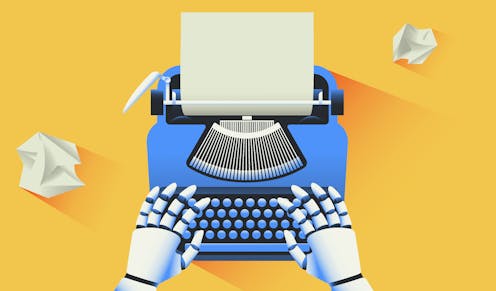Your next favorite story won’t be written by AI – but it could be someday
- Written by Haoran Chu, Assistant Professor of Communications, University of Florida
 AI language models are getting pretty good at writing – but not so much at creative storytelling.Moor Studio/DigitalVision Vectors via Getty Images
AI language models are getting pretty good at writing – but not so much at creative storytelling.Moor Studio/DigitalVision Vectors via Getty ImagesStories define people – they shape our relationships, cultures and societies. Unlike other skills replaced by technology, storytelling has remained uniquely human, setting people apart from machines. But now, even storytelling is being challenged. Artificial intelligence, powered by vast datasets, can generate stories that sometimes rival, or even surpass, those written by humans.
Creative professionals have been among the first to feel the threat of AI. Last year, Hollywood screenwriters protested, demanding – and winning – protections against AI replacing their jobs. As universityprofessors, we’ve seen student work that seems suspiciously AI-generated, which can be frustrating.
Beyond the threat to livelihoods, AI’s ability to craft compelling, humanlike stories also poses a societal risk: the spread of misinformation. Fake news, which once required significant effort, can now be produced with ease. This is especially concerning because decades of research have shown that people are often more influenced by stories than by explicit arguments and entreaties.
We set out to study how well AI-written stories stack up against those by human storytellers. We found that AI storytelling is impressive, but professional writers needn’t worry – at least not yet.
The power of stories
How do stories influence people? Their power often lies in transportation – the feeling of being transported to and fully immersed in an imagined world. You’ve likely experienced this while losing yourself in the wizarding world of Harry Potter or 19th-century English society in “Pride and Prejudice.” This kind of immersion lets you experience new places and understand others’ perspectives, often influencing how you view your own life afterward.
When you’re transported by a story, you not only learn by observing, but your skepticism is also suspended. You’re so engrossed in the storyline that you let your guard down, allowing the story to influence you without triggering skepticism in it or the feeling of being manipulated.
Given the power of stories, can AI tell a good one? This question matters not only to those in creative industries but to everyone. A good story can change lives, as evidenced by mythical and nationalist narratives that have influenced wars and peace.
 Storytelling can be powerfully influential – especially if people sense the human behind the words.georgeclerk/E+ via Getty Images
Storytelling can be powerfully influential – especially if people sense the human behind the words.georgeclerk/E+ via Getty ImagesStudying whether AI can tell compelling stories also helps researchers like us understand what makes narratives effective. Unlike human writers, AI provides a controlled way to experiment with storytelling techniques.
Head-to-head results
In our experiments, we explored whether AI could tell compelling stories. We used descriptions from published studies to prompt ChatGPT to generate three narratives, then asked over 2,000 participants to read and rate their engagement with these stories. We labeled half as AI-written and half as human-written.
Our results were mixed. In three experiments, participants found human-written stories to be generally more “transporting” than AI-generated ones, regardless of how the source was labeled. However, they were not more likely to raise questions about AI-generated stories. In multiple cases, they even challenged them less than human-written ones. The one clear finding was that labeling a story as AI-written made it less appealing to participants and led to more skepticism, no matter the actual author.
Why is this the case? Linguistic analysis of the stories showed that AI-generated stories tended to have longer paragraphs and sentences, while human writers showed more stylistic diversity. AI writes coherently, with strong links between sentences and ideas, but human writers vary more, creating a richer experience. This also points to the possibility that prompting AI models to write in more diverse tones and styles may improve their storytelling.
These findings provide an early look at AI’s potential for storytelling. We also looked at research in storytelling, psychology and philosophy to understand what makes a good story.
We believe four things make stories engaging: good writing, believability, creativity and lived experience. AI is great at writing fluently and making stories believable. But creativity and real-life experiences are where AI falls short. Creativity means coming up with new ideas, while AI is designed to predict the most likely outcome. And although AI can sound human, it lacks the real-life experiences that often make stories truly compelling.
Closing in?
It’s too early to come to a definitive conclusion about whether AI can eventually be used for high-quality storytelling. AI is good at writing fluently and coherently, and its creativity may rival that of average writers. However, AI’s strength lies in predictability. Its algorithms are designed to generate the most likely outcome based on data, which can make its stories appealing in a familiar way. This is similar to the concept of beauty in averageness, the documented preference people have for composite images that represent the average face of a population. This predictability, though limiting true creativity, can still resonate with audiences.
For now, screenwriters and novelists aren’t at risk of losing their jobs. AI can tell stories, but they aren’t quite on par with the best human storytellers. Still, as AI continues to evolve, we may see more compelling stories generated by machines, which could pose serious challenges, especially when they’re used to spread misinformation.
The authors do not work for, consult, own shares in or receive funding from any company or organization that would benefit from this article, and have disclosed no relevant affiliations beyond their academic appointment.
Authors: Haoran Chu, Assistant Professor of Communications, University of Florida
